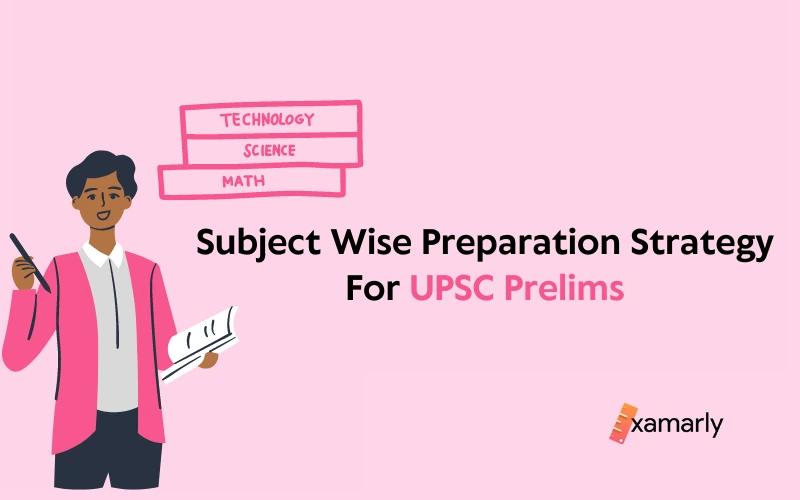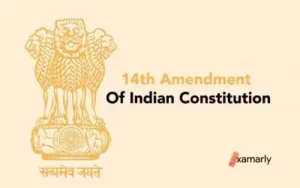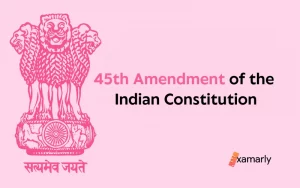Are you wondering how to devise a subject wise preparation strategy for UPSC prelims? UPSC is considered to be quite tough, but if you are well prepared with your subject-wise preparation strategy for UPSC Prelims, then you can prepare for this examination in the best possible way.
This article will help you to build the perfect subject-wise preparation strategy for UPSC Prelims and apply it effectively. The UPSC CSE Prelims exam consists of two papers, Paper-I and Paper II.
Paper I is general studies that test your knowledge of current affairs, history, politics, geography, economy, and general science. The second paper is for the aptitude test which tests your problem-solving skills in mathematics and reasoning.
- How to Start Preparing for UPSC Prelims
- 7 Ways to Devise a Subject-Wise Preparation Strategy for UPSC Prelims
- UPSC Prelims Examination Syllabus
- UPSC Prelims Syllabus of GS Paper I
- UPSC Prelims Exam Syllabus of CSAT
- Detailed Analysis of UPSC Prelims Syllabus
- How To Prepare For Any Subject For UPSC CSE Prelims
- Subject Wise UPSC Prelims Exam Preparation Tips
- Science And Technology
- Economics
- Environment and Ecology
- Polity
- Geography
- History
- Art & Culture
- Current Affairs
- Conclusion
- Frequently Asked Questions
- What are the most important subjects for UPSC Prelims?
- How should I create a subject-wise preparation strategy for UPSC Prelims?
- Which books are the best for subject-wise preparation for UPSC Prelims?
- What is the ideal time to start subject-wise preparation for UPSC Prelims?
- How to prepare for History subjects for UPSC Prelims?
- How to prepare for Geography subjects for UPSC Prelims?
- How to prepare for Polity subject for UPSC Prelims?
How to Start Preparing for UPSC Prelims
The first step to start your UPSC Prelims exam preparation is to gain a complete understanding of the exam. Read about the exam pattern, eligibility criteria, and syllabus. This will help you create a study plan that suits your schedule, strengths, and weaknesses.
Next, create a study plan and set a target to complete the syllabus within a reasonable timeframe. Allocate enough time for revision and practice. Ensure that you cover the entire syllabus of the UPSC Prelims exam, starting with basic books and gradually moving to advanced ones.
Choose the right books and study material that cover the entire syllabus of the UPSC Prelims exam. You can refer to NCERT books, standard reference books, newspapers, and magazines. Take notes and make short summaries to help you revise better.
Practice previous years’ question papers and take mock tests to get a sense of the exam pattern and improve your speed and accuracy. It will also help you to identify your strengths and weaknesses and improve upon them.
Stay updated with current affairs and read newspapers and magazines. Note down important news and events related to national and international affairs, economics, the environment, and science and technology. This will help you to score well in the General Studies paper.
Regular revision is crucial to retain what you learn. Create a revision schedule and revise regularly to keep the topics fresh in your mind. Joining a coaching institute is not mandatory, but it can help you get a better understanding of the exam and clear your doubts.
Last but not least, maintain a healthy lifestyle, eat well, and get enough rest. This will help you stay focused and energized throughout your preparation.
By following these steps, you can create a strong foundation and increase your chances of success in the UPSC Prelims exam.
Read More: UPSC Preparation Tips From Toppers: 10 Effective Tips
7 Ways to Devise a Subject-Wise Preparation Strategy for UPSC Prelims
To devise a subject-wise strategy for the UPSC prelims exam, you can follow these steps:
- Understand the syllabus: Familiarize yourself with the syllabus and topics covered in each subject.
- Prioritize subjects: Prioritize the subjects based on your strengths and weaknesses. Allocate more time to the subjects you find challenging.
- Make a study plan: Make a study plan based on the number of topics, their weightage, and the time available. Allocate more time to the topics with higher weightage.
- Study material: Collect good quality studies material such as NCERT books, standard reference books, newspapers, magazines, etc.
- Practice questions: Solve previous years’ papers, mock tests, and practice questions to get a better understanding of the exam pattern and build your confidence.
- Revision: Regular revision is key to retaining information. Revise regularly to keep the topics fresh in your mind.
- Stay updated: Stay updated with current affairs and keep a note of important events and their impact on society, economy, and politics.
Also Read: How to Prepare For CSAT UPSC 2022 – Best Strategies and Tips
UPSC Prelims Examination Syllabus
To formulate a subject-wise preparation strategy for UPSC Prelims preparation we first need to understand the IAS syllabus.
UPSC Prelims Syllabus of GS Paper I
- Current events of national and international importance.
- History of India and Indian National Movement.
- Indian and World Geography-Physical, Social, Economic Geography of India and the World.
- Indian Polity and Governance – Constitution, Political System, Panchayati Raj, Public Policy, Rights Issues, etc.
- Economic and Social Development – Sustainable Development, Poverty, Inclusion, Demographics, Social Sector Initiatives, etc.
- General issues on Environmental Ecology, Bio-diversity, and Climate Change – that do not require subject specialization.
- General Science.
UPSC Prelims Exam Syllabus of CSAT
- Comprehension
- Interpersonal skills including communication skills
- Logical reasoning and analytical ability
- Decision-making and problem-solving
- General mental ability
- Basic numeracy (numbers and their relations, orders of magnitude, etc.) (Class X level), Data interpretation (charts, graphs, tables, data sufficiency, etc. – Class X level)
Detailed Analysis of UPSC Prelims Syllabus
The UPSC Prelims exam is the first stage of the Civil Services Examination conducted by the Union Public Service Commission (UPSC) for recruitment to various civil services of the Government of India, including the Indian Administrative Service (IAS), Indian Police Service (IPS), and Indian Foreign Service (IFS).
The exam is conducted in two papers – General Studies Paper I and General Studies Paper II (CSAT). General Studies Paper I tests the candidate’s knowledge of current events, history, geography, economics, and social development. General Studies Paper II (CSAT) evaluates the candidate’s aptitude and comprehension skills.
Each paper carries a maximum of 200 marks, and the duration of each paper is 2 hours. Both papers are objective type, consisting of multiple-choice questions. The questions are in English and Hindi. There is a negative marking for incorrect answers.
Candidates must clear both papers with minimum qualifying marks to be eligible for the UPSC Main exam. The qualifying mark for General Studies Paper II (CSAT) is 33%, and it is only qualifying in nature. The marks obtained in General Studies Paper I are considered for the merit list and to qualify for the UPSC Main exam.
In conclusion, the UPSC Prelims exam is a crucial stage in the Civil Services Examination, and candidates must prepare well to clear it with good marks to be eligible for the UPSC Main exam.
How To Prepare For Any Subject For UPSC CSE Prelims
Here is the basic overview of how you can plan out your subject-wise preparation strategy for UPSC Prelims.
- Read the UPSC Syllabus carefully of the particular subject to learn about what to cover in that subject and can filter out irrelevant topics. Hence help you to maintain your focus on UPSC Preparation.
- Examine previous years’ papers: This will enable you to understand the level of the question and the type of questions asked in UPSC Prelims.
- Start your UPSC Prelims Preparation with NCERT of the subject that you have to cover. In this way, you can develop a strong understanding of the key concepts of that particular subject.
- Next, raise your level of preparation for UPSC Prelims by covering that particular subject from its standard books. Keep the study resources limited as the quality of the study matters not the number (quantity) of books.
- Apart from the preparation for the IAS exam from study materials, attempt mock tests subject-wise to enhance your UPSC IAS preparation.
Subject Wise UPSC Prelims Exam Preparation Tips
Follow these pro tips for your subject-wise preparation strategy for UPSC Prelims:
Science And Technology
Being abstract, this subject follows no set pattern. Mostly, the questions asked in this section are analytical.
Clear your basic concepts from study material like the NCERT books of science. Your focus should be on the recent development in the field of science and technology. So cover the current affairs of science and technology from newspapers.
Economics
Generally, concept-based questions are asked in UPSC Prelims. So you are required to have basic concepts. Read NCERT for this subject to clear basic concepts and raise your level of understanding from the standard books. Cover current affairs from the economic section of newspapers for your preparation for economics.
Environment and Ecology
There is a significant overlap between the UPSC syllabus of Environment and Ecology with Geography, Science and technology, and current affairs. Hence, covering its syllabus properly will also give an edge to the stated subjects.
Make your basic knowledge clear and cover the current issues from newspapers.
Wildlife sanctuaries, national parks, their locations, endangered species in India and their habitat, and various international conventions on climate change, etc. are important topics that need your attention.
Polity
While preparing for Polity, your focus should be on the topics such as the Constitution, Panchayati Raj, the federation structure of India, the election process, etc.
Also, Fundamental Rights and Duties, Directive Principles on State Policy, President, and Parliament are important that need your attention under the constitution section.
The best thing about this subject is that the questions are more or less direct and can easily be answered if you study properly.
Geography
World Geography can be covered by map reading as the questions used to be on current development. A thorough understanding of Indian Geography is required as the questions from Indian Geography are more than World Geography.
Have proper knowledge of physical India as well as knowledge of the location. This will be beneficial to the candidates in the topics of economics and human aspects of Indian Geography.
History
Fact-based questions are generally asked from Ancient and Medieval History whereas questions from Modern History are conceptual.
The questions under Indian History are mostly asked from Modern History, particularly between the 1857 to 1947 period. Such as the 1857 uprising revolt, social reform movements, the National movement under the Indian National Congress, etc.
Study this subject thoroughly as it is one of the most important subjects of UPSC Prelims as a lot of questions are asked from this field. Know more about the preparation strategy of History from the linked article.
Art & Culture
This section has gained the popularity in UPSC Civil Services Exam with time and hence become important in UPSC Prelims. While covering this section, give your attention to dance forms, paintings, architecture, folk cultures, etc.
To prepare for this subject, go through the previous year’s paper as this will help you to know the type of questions asked and the exam pattern. Also, cover the current affairs related to art and culture which were in news. This way you will be able to prepare it well.
Current Affairs
Current affairs are one of the core sections of the UPSC CSE Prelims as it is covered in every section/unit of the UPSC Prelims.
Questions regarding international relations, social justice, economics, science and technology, defence, security issues in news, government initiatives, etc are asked in UPSC Prelims.
Prepare it from the daily newspapers like “The Hindu” or “Indian Express” to stay up to date about the current events happening across the globe. Spend one or one and a half-hour daily on this section.
Besides daily newspapers, cover it from weekly news gist or monthly magazines. These weekly or monthly magazines will serve as a revision tool that will help you to revise the current affairs and will help you to learn about that news that you might have skipped before.
It is considered tough to be covered as it does not have a specific syllabus. Candidates must know how to correlate these current issues with the UPSC CSE Syllabus. So make proper notes of the current affairs as this will save enough time in revising it.
These were some of the tips to help you sketch out your subject-wise preparation strategy for UPSC Prelims. Know more about how to read “The Hindu” newspaper to cover current affairs and how to study its editorial section from the linked article.
Read: How to study the editorial from the Hindu newspaper.
Read: 9 Effortless Tips: How To Read “The Hindu” Newspaper For Current Affairs For UPSC
Conclusion
Remember, try to cover everything mentioned in the UPSC Prelims Syllabus and give equal importance to every aspect of the syllabus as no one knows what comes in the exam.
You need to understand that at times, even if you feel you have covered enough syllabus, you still may not gain marks in a particular subject. The reason is that a candidate who reads the Question Paper critically and knows precisely how to plan his/her time will not only save time but get better marks rather than going by the books alone.
Thus, the most common way is to successfully identify your weakest areas and then focus on those with more study hours.
We hope we could help you make the best subject-wise preparation strategy for UPSC Prelims. And if you need to create a study plan especially suited for you, consider using our Examarly app for personalized and concise study plans!
Frequently Asked Questions
What are the most important subjects for UPSC Prelims?
The most important subjects for UPSC Prelims are History, Geography, Polity, Economy, and Current Affairs.
How should I create a subject-wise preparation strategy for UPSC Prelims?
To create a subject-wise preparation strategy for UPSC Prelims, first, understand the exam pattern and syllabus. Then, create a study plan and set a target to complete the syllabus within a reasonable timeframe. Allocate enough time for revision and practice, and choose the right books and study material.
Which books are the best for subject-wise preparation for UPSC Prelims?
For History, refer to NCERT books, Spectrum, and Bipan Chandra. For Geography, refer to NCERT books, Goh Cheng Leong, and Majid Hussain. For Polity, refer to Laxmikant, and for Economy, refer to Ramesh Singh. For Current Affairs, refer to newspapers and magazines.
What is the ideal time to start subject-wise preparation for UPSC Prelims?
The ideal time to start subject-wise preparation for UPSC Prelims is around 10-12 months before the exam date.
How to prepare for History subjects for UPSC Prelims?
To prepare for History subject for UPSC Prelims, refer to NCERT books, Spectrum, and Bipan Chandra. Take notes and make short summaries to help you revise better. Practice previous years’ question papers and take mock tests.
How to prepare for Geography subjects for UPSC Prelims?
To prepare for Geography subject for UPSC Prelims, refer to NCERT books, Goh Cheng Leong, and Majid Hussain. Take notes and make short summaries to help you revise better. Practice previous years’ question papers and take mock tests.
How to prepare for Polity subject for UPSC Prelims?
To prepare for Polity subject for UPSC Prelims, refer to Laxmikant’s Indian Polity. Take notes and make short summaries to help you revise better. Practice previous years’ question papers and take mock tests.






